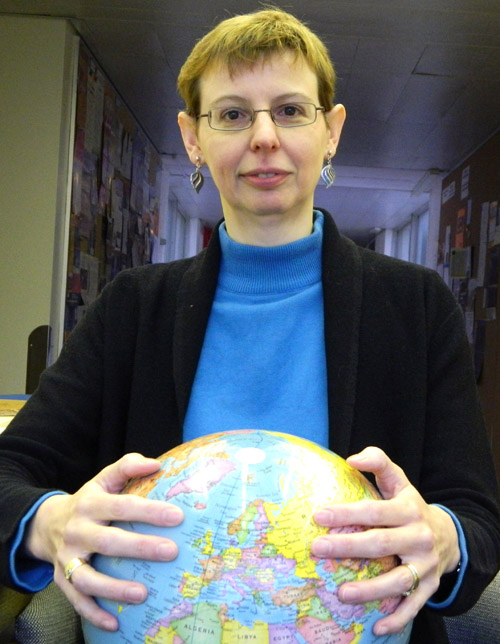
A popular song may tell us “it’s a small world” but often it seems like a big one, with communication barriers between nations that may appear insurmountable.
But there are ways to build bridges over those barriers. One way Europe promotes understanding and cross-cultural connections, despite multiple languages and cultures, is to offer consortium programs, where students attend two or more universities in different countries in the process of earning a graduate degree. An organization called Erasmus Mundus, set up by the European community, organizes these programs and ensures that credits earned at one school are accepted by other schools.
Now one of these programs, Crossways in Cultural Narratives, includes U of G as a full partner with seven European universities.
According to languages and literatures professor Paola Mayer, U of G is the first Canadian university to be included in a consortium. “Crossways” was also one of only 30 successful projects approved for funding by the European Commission’s Education, Audiovisual and Culture Executive Agency.
“When they heard about the European Studies courses we already had, the other participating schools realized it could be a good fit. It enhances the experience for U of G students, too. International participants in the program will attend classes with other U of G students, making the classes more international,” says Mayer.
What the consortium offers is a “new MA stream,” says Clive Thomson, director of the School of Languages and Literatures. “There is nothing like it. If I was 30 years younger, I’d apply.”
The program is a two-year master’s course in comparative literature, cultural anthropology, textual, visual and inter-media studies. To apply, students must have a BA, be proficient in at least two of the languages in the consortium (English, French, Spanish, Portuguese, Italian and Polish) and willing to learn a third.
Students choose from several different pathways (including gender studies, text and image, and literary history). The first semester is spent studying at one university, the second and third at another, and the fourth and final semester at a third school. A different language must be spoken at each school.
The process of joining the consortium began some two years ago, says Thomson, at a conference organized by some University of Guelph European Studies professors. “A group of universities was applying for funding, but one condition had been to find a university outside of Europe. Realizing the affinities between our program and their goals, they asked us to join.”
The European Commission has earmarked money for scholarships for students interested in the program, Thomson adds. “There is also money to send professors from the U of G to the European universities, and for their professors to come here, in an exchange process. We already have a professor from France who is interested in coming here.”
In Europe, as in Canada, the buzzword in most industries is internationalism, Mayer adds. “Students in this program will have three languages brought up to fluency, and will have lived in three different countries over a period of two years, learning about how life works in those places.” This experience can only enhance the student’s resume when applying for work or further education, she says.
In addition, Mayer says, students can earn credits through internships or work projects at various museums, art galleries, visual arts agencies, film schools and institutes, book fairs and international financial institutions. “This adds experiential learning to the breadth of courses available through the program,” she points out. “Of course, just living in the different countries is experiential, too.”
Students who complete the program receive both an international diploma supplement meeting European standards and master’s degree certificates from each of the three universities attended. In past consortiums, according to Mayer, about one-third of the students went on to complete PhDs, while the others found work in their field.
“No question, it’s a challenging program,” she says. “That’s what makes it so attractive.” Thomson agrees: “This program is aimed at the very ambitious student, who wants to maximize the international experience and who believes he or she has what it takes to adjust to learning in three different cultures.”
Students seeking scholarships should apply by the end of January.